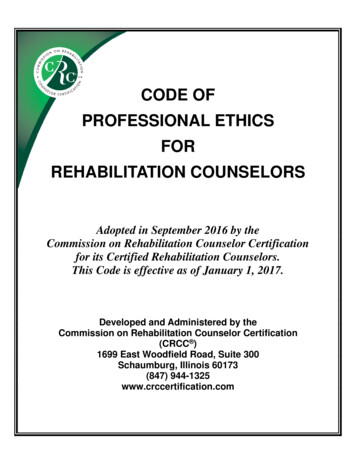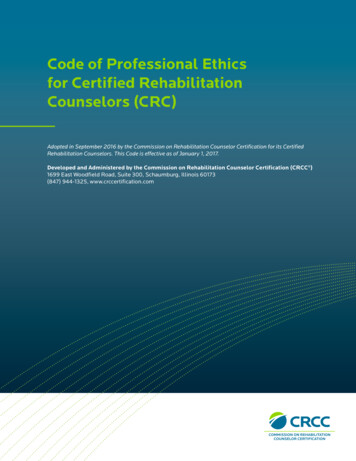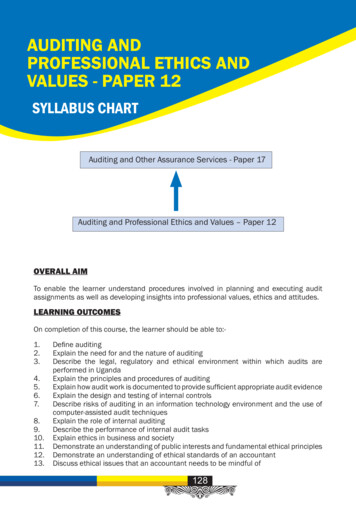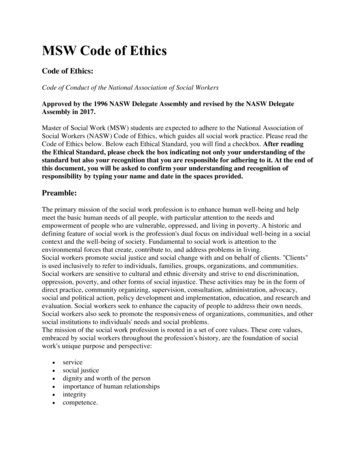
Transcription
CODE OFPROFESSIONAL ETHICSFORREHABILITATION COUNSELORSAdopted in September 2016 by theCommission on Rehabilitation Counselor Certificationfor its Certified Rehabilitation Counselors.This Code is effective as of January 1, 2017.Developed and Administered by theCommission on Rehabilitation Counselor Certification(CRCC )1699 East Woodfield Road, Suite 300Schaumburg, Illinois 60173(847) 944-1325www.crccertification.com
TABLE OF CONTENTSPREAMBLE1ENFORCEABLE STANDARDS OF ETHICAL PRACTICE4Section A: The Counseling RelationshipIntroductionA.1.Welfare of Those ServedA.2.Respecting DiversityA.3.Client RightsA.4.Avoiding Value ImpositionA.5.Roles and Relationships with ClientsA.6.Multiple ClientsA.7.Group WorkA.8.Termination and ReferralA.9.End-of-Life Care for Terminally Ill Clients44445667778Section B: Confidentiality, Privileged Communication, and PrivacyIntroductionB.1.Respecting Client RightsB.2.ExceptionsB.3.Information Shared with OthersB.4.Groups and FamiliesB.5.Responsibility to Clients Lacking Capacity to ConsentB.6.Records and DocumentationB.7.Case Consultation88991010101112Section C: Advocacy and lity12121213Section D: Professional ResponsibilityIntroductionD.1.Professional CompetenceD.2.Cultural Competence/DiversityD.3.Functional CompetenceD.4.Professional CredentialsD.5.Responsibility to the Public and Other ProfessionalsD.6.Scientific Bases for Interventions1313131414141515Section E: Relationships with Other Professionals and EmployersIntroductionE.1.Relationships with Colleagues, Employers, and EmployeesE.2.Organization and Team RelationshipsE.3.Provision of Consultation Services1616161717Section F: Forensic ServicesIntroductionF.1.Evaluee RightsF.2.Forensic Competency and ConductF.3.Forensic PracticesF.4.Forensic Business Practices181818181919Section G: Assessment and EvaluationIntroductionG.1.Informed ConsentG.2.Release of Assessment or Evaluation Information20202020
G.3.G.4.G.5.G.6.G.7.G.8.G.9.G.10.Proper Diagnosis of Mental DisordersCompetence to Use and Interpret Tests/InstrumentsTest/Instrument SelectionTest/Instrument Administration ConditionsTest/Instrument Scoring and InterpretationTest/Instrument SecurityObsolete Tests/Instruments and Outdated ResultsTest/Instrument Construction2021212122222222Section H: Supervision, Training, and TeachingIntroductionH.1.Clincial Supervisor ResponsibilitiesH.2.Clinical Supervisor CompetenceH.3.Roles and Relationships Between Clincial Supervisorsand SuperviseesH.4.Supervision Evaluation, Remediation, and EndorsementH.5.Rehabilitation Counselor Educator ResponsibilitiesH.6.Rehabilitation Counselor Educator CompetenceH.7.Roles and Relationships Between Educators and StudentsH.8.Education Evaluation, Remediation, and Endorsement2222232324Section I: Research and PublicationIntroductionI.1.Research ResponsibilitiesI.2.Rights of Research ParticipantsI.3.Reporting ResultsI.4.Research Publications and PresentationsI.5.Managing and Maintaining Boundaries27272728293030Section J: Technology, Social Media, and Distance CounselingIntroductionJ.1.Competence and Legal , Informed Consent, and SecurityJ.4.Social Media313131313132Section K: Business PracticesIntroductionK.1.Advertising and Soliciting ClientsK.2.Client RecordsK.3.Fees, Bartering, and BillingK.4.Termination and Referral323233333434Section L: Resolving Ethical IssuesIntroductionL.1.Knowledge of Ethical Standards and the LawL.2.Addressing Suspected ViolationsL.3.Conduct in Addressing Ethical Issues3434353536GLOSSARY OF TERMS242526262737
PREAMBLEPURPOSEThe Code of Professional Ethics for Rehabilitation Counselors, henceforth referred to as the Code, isdesigned to provide guidance for the ethical practice of rehabilitation counselors.The basic objectives of the Code are to: (1) promote public welfare by specifying ethical behaviorexpected of rehabilitation counselors; (2) establish principles that guide ethical behavior of rehabilitationcounselors; (3) serve as an ethical guide designed to assist rehabilitation counselors in constructing aprofessional course of action that best serves those utilizing rehabilitation counseling services; and (4)serve as the basis for the processing of alleged Code violations by certified rehabilitation counselors.REHABILITATION COUNSELING SCOPE OF PRACTICERehabilitation counseling is a systematic process which assists persons with physical, mental,developmental, cognitive, and emotional disabilities to achieve their personal, career, and independentliving goals in the most integrated setting possible through the application of the counseling process. Thecounseling process involves communication, goal setting, and beneficial growth or change through selfadvocacy, psychological, vocational, social, and behavioral interventions. The specific techniques andmodalities utilized within this rehabilitation counseling process may include, but are not limited to: assessment and appraisal;diagnosis and treatment planning;career (vocational) counseling;individual and group counseling treatment interventions focused on facilitating adjustments to themedical and psychosocial impact of disability;case management, referral, and service coordination;program evaluation and research;interventions to remove environmental, employment, and attitudinal barriers;consultation services among multiple parties and regulatory systems;job analysis, job development, and placement services, including assistance with employment and jobaccommodations; andprovision of consultation about and access to rehabilitation technology.Rehabilitation counselors provide services within the Scope of Practice for Rehabilitation ice). They demonstrate beliefs, attitudes, knowledge, and skillsto provide competent rehabilitation counseling services and to work collaboratively with diverse groups ofindividuals, including clients, as well as with programs, institutions, employers, and service deliverysystems and provide both direct (e.g., counseling) and indirect (e.g., case review, feasibility evaluation)services. Regardless of the specific tasks, work settings, or technology used, rehabilitation counselorsdemonstrate adherence to ethical standards and make reasonable efforts to ensure the standards arevigorously enforced.VALUES AND PRINCIPLESRehabilitation counselors are committed to facilitating the personal, economic, and social independenceof individuals with disabilities. In fulfilling this commitment, rehabilitation counselors recognize diversityand embrace a cultural approach in support of the worth, dignity, potential, and uniqueness of individualswith disabilities within their social and cultural context. They look to professional values as an important1
way of living out an ethical commitment. The primary values that serve as a foundation for this Codeinclude a commitment to: respecting human rights and dignity;ensuring the integrity of all professional relationships;acting to alleviate personal distress and suffering;enhancing the quality of professional knowledge and its application to increase professional andpersonal effectiveness;promoting empowerment through self-advocacy and self-determination;appreciating the diversity of human experience and appreciating culture;emphasizing client strengths versus deficits;serving individuals holistically; andadvocating for the fair and adequate provision of services.These values inform principles. They represent one important way of expressing a general ethicalcommitment that becomes more precisely defined and action-oriented when expressed as a principle.The fundamental spirit of caring and respect with which the Code is written is based upon six principlesof ethical behavior:Autonomy: To respect the rights of clients to be self-governing within their social and culturalframework.Beneficence: To do good to others; to promote the well-being of clients.Fidelity: To be faithful; to keep promises and honor the trust placed in rehabilitation counselors.Justice: To be fair in the treatment of all clients; to provide appropriate services to all.Nonmaleficence: To do no harm to others.Veracity: To be honest.COMMITMENT TO CULTURAL DIVERSITYRehabilitation counselors are aware that all individuals exist in a variety of contexts and understand theinfluence of these contexts on an individual’s behavior. Rehabilitation counselors are aware of thecontinuing evolution of the field, changes in society at large, and the different needs of individuals insocial, political, historical, environmental and economic contexts. The commitment involves providingrespectful and timely communication, taking appropriate action when cultural diversity issues occur, andbeing accountable for the outcomes as they affect people of all races, ethnicities, genders, nationalorigins, religions, sexual orientations, or other cultural group identities.CLIENTS/EVALUEESThe primary obligation of rehabilitation counselors is to clients, defined as individuals with or directlyaffected by a disability, who receive services from rehabilitation counselors. At times, rehabilitationcounseling services may be provided to individuals other than those with disabilities. In some settings,clients may be referred to by other terms such as, but not limited to, consumers.When employed to render an opinion for a forensic purpose, rehabilitation counselors do not haveclients. In a forensic setting, the evaluee is the person who is being evaluated. If a section or standard inthe Code does not seem to be relevant to forensic practice, rehabilitation counselors should neverthelessadhere to the spirit of the Code.2
STRUCTURE OF THE CODEThe Code consists of a Preamble, twelve main Sections, and a Glossary. The introductions to eachSection describe the ethical behavior and responsibility to which rehabilitation counselors aspire. Theintroduction helps set the tone for that Section and provides a starting point that invites reflection on theEnforceable Standards contained in each Section of the Code. The Enforceable Standards that followthe introduction outline professional responsibilities and provide direction for fulfilling those ethicalresponsibilities.The Enforceable Standards within the Code are the exacting, enforceable standards intended to provideguidance in specific circumstances and serve as the basis for processing complaints initiated againstcertified rehabilitation counselors. A breach of the Enforceable Standards provided herein do notnecessarily constitute legal liability or violation of the law; such action is established in legal and judicialproceedings.APPLYING THE CODEIndividual Enforceable Standards are not meant to be interpreted in isolation. Instead, EnforceableStandards should be interpreted as a body, with each Enforceable Standard interpreted in conjunctionwith other, related standards, throughout the Code. Actions of rehabilitation counselors should beconsistent with the spirit, as well as the letter, of these Enforceable Standards.Rehabilitation counselors acknowledge that resolving ethical issues is a process. When rehabilitationcounselors are faced with ethical dilemmas that are difficult to resolve, they are expected to engage in acarefully considered ethical decision-making process, consulting available resources as needed. Ethicalreasoning includes consideration of professional values, professional ethical principles, and ethicalstandards.Rehabilitation counselors are expected to use a credible model of ethical decision-making that can bearpublic scrutiny of its application. Through a chosen ethical decision-making process and evaluation of thecontext of the situation, rehabilitation counselors work to resolve any ethical dilemmas that may arise.Rehabilitation counselors need to be aware of laws related to their practice. At times legal and ethicalstandards may conflict. In such situations, rehabilitation counselors are encouraged to consult withsupervisors, legal/ethical experts, and others as appropriate and to use an ethical decision-making modelto inform the decision.3
ENFORCEABLE STANDARDS OF ETHICAL PRACTICESECTION A: THE COUNSELING RELATIONSHIPINTRODUCTIONRehabilitation counselors work in cooperation with their clients to promote client welfare and support themin developing and progressing toward their goals. Rehabilitation counselors understand that trust is thecornerstone of the counseling relationship, and they have the responsibility to respect and safeguard theclient’s right to privacy and confidentiality. Rehabilitation counselors respect the rights of clients to maketheir own decisions about matters that affect their own lives. Rehabilitation counselors make reasonableefforts to ensure clients are able to make informed choices about every aspect of the rehabilitationcounseling process. Rehabilitation counselors actively attempt to understand the diverse culturalbackgrounds of the clients they serve and do not discriminate in their provision of rehabilitation counselingservices. Rehabilitation counselors also explore their own cultural identities and how these affect theirvalues and beliefs.A.1. WELFARE OF THOSE SERVEDa. PRIMARY RESPONSIBILITY. The primary responsibility of rehabilitation counselors is to respect thedignity of clients and to promote their welfare. Clients are defined as individuals with or directly affected by adisability, who receive services from rehabilitation counselors. At times, rehabilitation counseling servicesmay be provided to individuals other than those with disabilities. When employed to render an opinion for aforensic purpose, rehabilitation counselors do not have clients. In a forensic setting, the evaluee is theperson who is being evaluated. (See Section F.)b. REHABILITATION COUNSELING PLANS. Rehabilitation counselors and clients work together todevelop integrated, individual, mutually agreed-upon, written rehabilitation counseling plans that offer areasonable promise of success and are consistent with the abilities and circumstances of clients.Rehabilitation counselors and clients regularly review rehabilitation counseling plans to assess theircontinued viability and effectiveness and to revise them as needed.c. EMPLOYMENT NEEDS. Rehabilitation counselors work with clients to consider employment consistentwith the overall abilities, functional capabilities and limitations, general temperament, interest and aptitudepatterns, social skills, education, general qualifications, transferable skills, geographic locations, and otherrelevant characteristics and needs of clients. Rehabilitation counselors facilitate the placement of clients inpositions consistent with their interests, culture, and welfare. Rehabilitation counselors assist clients inunderstanding potential constraints on employment and placement choices (e.g., organizational policies,policies of external funding sources, legal requirements).d. AVOCATIONAL AND INDEPENDENT LIVING GOALS. Rehabilitation counselors work with clients todevelop avocational and independent living goals consistent with their abilities, interests, culture, needs,and welfare.e. AUTONOMY. Rehabilitation counselors respect the rights of clients to make decisions on their ownbehalf in accordance with their cultural identity and beliefs. Decision-making on behalf of clients that limitsor diminishes the autonomy of the client is made only after careful deliberation. Rehabilitation counselorsadvocate for the resumption of responsibility by clients as quickly as possible.A.2. RESPECTING DIVERSITYa. RESPECTING CULTURE. Rehabilitation counselors demonstrate respect for the cultural identity ofclients in developing and implementing rehabilitation and treatment plans, and providing and adaptinginterventions.4
b. NONDISCRIMINATION. Rehabilitation counselors do not condone or engage in the prejudicial treatmentof an individual or group based on their actual or perceived membership in a particular group, class, orcategory.A.3. CLIENT RIGHTSa. PROFESSIONAL DISCLOSURE STATEMENT. Rehabilitation counselors review with clients, both orallyand in writing, the rights and responsibilities of both the rehabilitation counselor and client. These arepresented in a manner best suited to the needs of the client. Disclosure at the outset of the professionalrelationship minimally includes:(1) the qualifications, credentials, and relevant experience of the rehabilitation counselor;(2) purposes, goals, techniques, limitations, and the nature of potential risks and benefits of services;(3) frequency and length of services;(4) confidentiality and limitations regarding confidentiality (including how a supervisor and/or treatment teamprofessional is involved);(5) contingencies for continuation of services upon the extended absence, incapacitation, or death of therehabilitation counselor;(6) fees and/or payment arrangements;(7) record preservation and release policies;(8) risks associated with electronic communication; and(9) legal issues affecting services.When necessary, rehabilitation counselors disclose other information consistent with organization and/oremployer policies or legal requirements. Rehabilitation counselors recognize that disclosure of these issuesmay need to be reiterated or expanded upon throughout the professional relationship.b. INFORMED CONSENT. Rehabilitation counselors recognize that clients have the freedom to choosewhether to enter into or remain in a professional relationship. Rehabilitation counselors respect the rights ofclients to participate in ongoing rehabilitation counseling planning and to make decisions to refuse anyservices or modality changes, while also ensuring that clients are advised of the consequences of suchrefusal. Rehabilitation counselors recognize that clients need information to make an informed decisionregarding services and that professional disclosure must be an ongoing part of the rehabilitation counselingprocess so clients are able to provide informed consent. Rehabilitation counselors appropriately documentdiscussions of disclosure and informed consent throughout the professional relationship.c. INDIVIDUALIZED APPROACH TO COMMUNICATION. Rehabilitation counselors communicateinformation in ways that are both developmentally and culturally appropriate. Rehabilitation counselorsarrange for a qualified interpreter or translator when necessary to ensure comprehension by clients.Rehabilitation counselors consider cultural implications of informed consent procedures and, when possible,rehabilitation counselors adjust their practices accordingly.d. INABILITY TO GIVE CONSENT. When counseling minors or persons who lack the capacity to givevoluntary informed consent, rehabilitation counselors seek the assent of clients and include clients indecision-making as appropriate. Rehabilitation counselors recognize the need to balance the: (1) ethicalrights of clients to make choices; (2) cognitive or legal capacity of clients to give consent or assent; and (3)legal rights and responsibilities of legal guardians, including parents who are legal guardians, or families(e.g., “next of kin” notification situations) to protect clients and make decisions on their behalf.e. SUPPORT NETWORK INVOLVEMENT. Rehabilitation counselors recognize that support by others maybe important to clients. When appropriate and with consent from clients, rehabilitation counselors enlist thesupport and involvement of others (e.g., religious/spiritual/community leaders, family members, friends,legal guardians).5
A.4. AVOIDING VALUE IMPOSITIONRehabilitation counselors are aware of and avoid imposing their own values, attitudes, beliefs, andbehaviors. Rehabilitation counselors respect the diversity of clients and seek training in areas in which theyare at risk of imposing their values onto clients, especially when the rehabilitation counselor’s values areinconsistent with the
Jan 01, 2017 · When employed to render an opinion for a forensic purpose, rehabilitation counselors do not have clients. In a forensic setting, the evaluee is the person who is being evaluated. If a section or standard in the Code does not seem to be relevant to forensic practice, rehabilitation counsel











